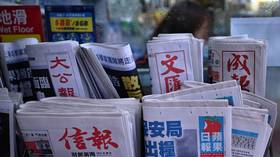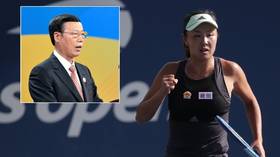Why China is losing the war of words with the West

An unconvincing attempt to explain the disappearance of tennis player Peng Shuai highlights how poor China is at communications. This failing explains why the West is constantly able to set a damaging narrative about Beijing.
Chinese tennis star Peng Shuai disappeared from public view following allegations of sexual assault she directed at a Chinese government official, prompting a concerned response from many in the game, including former world number one Naomi Osaka.
While it’s not uncommon for celebrities in China to ‘disappear’ if they have created a political controversy – a prominent recent example was businessmen Jack Ma – it is unlikely, given the circumstances, that Peng has been arrested or won’t be seen again. However, what is undeniable is that China isn’t helping its own case with its response to the story.
. #WhereIsPengShuaipic.twitter.com/51qcyDtzLq
— NaomiOsaka大坂なおみ (@naomiosaka) November 16, 2021
On Wednesday evening, broadcaster CGTN published on its social media platforms in the West an email purportedly sent to the Women’s Tennis Association from the player, in which she said she was OK and merely “resting”.
The problem was that the email was not convincing at all, and appeared as if it were a screenshot because a hovering cursor was visible. Predictably, the Western media piled on this botched public-relations effort, which lacked credibility, and used it to advance their narrative against China. Significantly, even supporters of that nation across the social media platforms refused to defend the email.
Chinese tennis star Peng Shuai has sent an email to Steve Simon, the WTA Chairman & CEO, CGTN has learned. The email reads: pic.twitter.com/uLi6Zd2jDI
— CGTN (@CGTNOfficial) November 17, 2021
But this blunder isn’t a one-off. It reveals a wider and much more obvious fact: China is bad, if not abysmal, at public relations and communications – or “propaganda” as its critics like to call it.
During a period in which the United States is actively waging a war of words against the country that has had, objectively speaking, significant success, Beijing is failing across the board in the battle for hearts and minds. Not only has it failed to establish a narrative to fight back, but it struggles to foreground the most basic talking points.
China is clearly more competent than many countries in the West in a host of areas, including how to organize a state bureaucracy, competently run an economic system, trade, and manage a pandemic. But this area is not one of them.
Having worked with the Chinese media myself and seen how it operates behind the scenes, I am honest enough to say it is rigid and therefore ineffective. It is very frustrating to see the advantage the US has over China in this sector – in particular, the inability of state media itself to confront the scale of propaganda and misinformation launched at Beijing every day. A huge overhaul is needed, with even Taiwan getting the better of it when it comes to setting the narrative – despite the fact it is clearly in a far weaker position.
So, what exactly is wrong with Chinese state media? With the exception of the Global Times, which is slightly more effective in getting a message out due to its aggressive posture, it is generally uninspiring, unadventurous, lacking in creativity and does not grasp the fundamental principles of how journalism works, which requires some artistry, as opposed to being about simply reporting things.
It is fair to say that this problem is somewhat rooted in the structural realities of China’s political system itself. In the West, “news” functions as a commercial capitalist commodity by being able to entertain, appeal, shock and scare its audiences, irrespective of the political agendas that might be behind it or of editorial independence or associations. A biased or disingenuous source of news is not necessarily an ineffective source of news.
In understanding this, journalists realise the fundamental need for their product to be competitive in the market. In China, however, news exists within the model of a hierarchical party system, and while critics will obviously dismiss it as “state messaging,” with limited independence, the structural problems run deeper than that.
The Chinese media simply does not have the institutionalized experience that forces outlets to be competitive in a market setting. For example, as much as many people hate the UK tabloid The Sun, it knows its audience very well – what’s never in doubt for me is its ability to know what stories will sell. And if it should ever fail at that, it would go out of business.
Contrast it with the China Daily, a state-funded newspaper, which doesn’t have to rely on an audience to make money and so operates inefficiently. Chinese media outlets all have enormous budgets, but spend them wastefully.
This leads me on to my next point: no Chinese outlet understands what it means to establish an audience. People consume news because it’s something they need – we want to learn about the world, the weather, the markets, sport, etc. We’re aware that many sources are biased or have a particular agenda, but we choose the outlets that best fit our needs. I’m staunchly critical of the BBC – I can observe its bias and identify when it’s pushing an agenda. But maybe I should ask myself why I keep looking at it so regularly?
On that note, we might ask, why do people need the Chinese media at all? These outlets offer very strict China-centric messaging, yet try to target overseas audiences. The BBC is popular precisely because it’s not UK-centric, but covers global affairs in depth and detail, and its own agenda is then carefully filtered in. But, in contrast, the Chinese media has little allure for people who don’t closely monitor politics or are interested in other topics. There’s no attempt to make the outlets a go-to source for anything beyond China itself (and even then, the content is often poorly executed).
Any prominent people outside China who read the Chinese media do so because they’re seeking to study the country or analyse its messaging, or because they strongly oppose it. You tend to get more hatred for writing for CGTN than you do for RT – and there’s rarely a receptive readership to counterbalance that.
China doesn’t have a normal, everyday, news-reading audience because it doesn’t try to cultivate one. It lacks purpose, which is also partly due to the structural limitations imposed on it. And this is why, when it’s sharing its messages and worldview with a global audience, it’s falling on deaf ears and can’t break through the influence of the mostly Western mainstream media, which continues to dominate and define the perception of China presented to the world.
It should surprise no one that its social media strategy is equally poor. The CGTN Twitter account, for example, professes to have 13.4 million followers, yet the lack of interaction is notable. This is due to the unspoken belief that Chinese media accounts should not try to build organic audiences. Indeed, many outlets have exaggerated their follower counts by bulk-buying fake followers (although Twitter’s “state-affiliated media” labels have not helped them improve their reach, either). The greatest number of interactions CGTN got this week was in response to the appallingly executed email concerning Peng Shuai, which Western journalists attacked with unconcealed relish.
So, when people say China is waging a propaganda war against the West, it should always be remembered how poor and ineffective that actually is. CGTN has a budget of $1 billion, and this was its product.
The US is indisputably waging a vitriolic public-opinion war against China, however. This has included weaponizing an army of think tanks, throwing around allegations of genocide, and coordinating negative news stories to tarnish China’s image in multiple areas, manufacture consent and turn Western public opinion against it.
Despite China being a highly organised state that has far greater resources and population, the methods it employs to fight back against the US are of a very poor quality, and this has been exposed through the saga of a missing tennis player and an unconvincing attempt to cover up her public absence.
Peng will eventually reappear, closing down this controversy. It’s the reality of contemporary China that celebrities who don’t toe the line politically are reeled in. However, the handling of this story reveals probably the weakest aspect of the country’s entire system: communications. It’s been too easy for the West to set a narrative against Beijing. China has to understand that journalism is not about simple top-down messaging, but about creativity, enterprise and fulfilling the needs of an audience. Until it does, it will continue to struggle to find its voice against US attacks.
Like this story? Share it with a friend!
The statements, views and opinions expressed in this column are solely those of the author and do not necessarily represent those of RT.

















